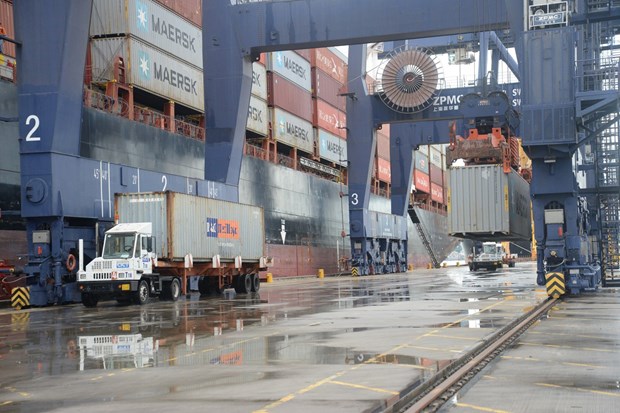As automation, artificial intelligence (AI), and digitalization rapidly transform Europe’s labor market, demand is shifting towards professionals with advanced technical skills and adaptability. Fields such as manufacturing, healthcare, and customer service are increasingly relying on technology, reshaping the qualities and expertise employers seek. For Vietnamese skilled professionals, this evolving landscape presents new opportunities and challenges.
This article explores how Europe’s changing labor market aligns with the strengths of Vietnamese skilled professionals, and the ways Vietnam’s manpower industry can adapt to ensure its workforce remains competitive.
1. The Impact of Automation on Europe’s Labor Market
Europe’s labor market is experiencing a significant shift as automation and AI redefine job roles. Automation is changing how work is performed, making certain manual tasks obsolete while creating new opportunities that require advanced skills. The chart below demonstrates the projected impact of automation on productivity in various industries:
- Job Displacement and Creation: Automation is expected to displace repetitive roles, especially in manufacturing, logistics, and customer service. At the same time, it generates new jobs in tech management, digital operations, and data analysis. A study by the European Commission indicates that automation may lead to significant job losses in some sectors, but it also opens up roles that require specialized technical skills.
- Skill Shifts and Reskilling Needs: As digital tools become central to industries, there is a heightened need for workers proficient in data handling, AI integration, and digital operations. The European Centre for the Development of Vocational Training (Cedefop) emphasizes that upskilling and reskilling initiatives are critical to meeting the demands of an automated market.
For Vietnamese skilled professionals, aligning their training and expertise with these new demands is essential to remain attractive to European employers navigating the automation wave.
2. Key Skills European Employers Seek in a Tech-Driven Workforce
With the integration of technology, European employers are increasingly prioritizing the following skills and qualities:
- Digital Literacy and Technical Skills: From using digital tools to understanding data analysis, digital literacy has become a foundational requirement in Europe’s workforce.
- Adaptability and Problem-Solving: As roles evolve with technological advancements, the ability to adapt and resolve issues is highly valued, especially in roles influenced by automation.
- Cross-Functional Capabilities: Many jobs now require a combination of technical and interpersonal skills, such as healthcare workers with digital proficiency or engineers with project management expertise.
Ensuring Vietnamese skilled professionals possess these qualities will help them remain competitive and meet the shifting requirements of Europe’s tech-centric job market.
3. The Role of Vietnamese Skilled Professionals in an Evolving Labor Market
Vietnamese skilled professionals bring unique strengths to the global workforce, which align well with Europe’s emerging needs:
Technical Expertise in High Demand
Vietnam’s focus on STEM education has produced a workforce skilled in engineering, IT, and technical manufacturing, all crucial areas for a tech-driven economy. This foundation positions Vietnamese professionals as excellent candidates for technical roles in automated settings, from advanced manufacturing to digital customer support.
Adaptability and Cultural Fit
Vietnamese workers are known for their adaptability and willingness to learn, making them ideal for environments where processes and technology change rapidly. This adaptability allows them to integrate smoothly into diverse cultural settings and adjust to new tools and methods, an invaluable asset in Europe’s multicultural and dynamic workplaces.
Commitment and Work Ethic
Vietnamese skilled professionals are highly regarded for their strong work ethic, dedication, and attention to quality. These traits contribute to higher productivity and consistent performance in roles requiring diligence, making them attractive to European employers.
4. Data-Driven Insights into Automation’s Impact on Job Roles
The following chart illustrates the effects of automation across different job categories, highlighting areas where Vietnamese skilled professionals could potentially excel:
Automation’s Effect on Manufacturing and Technical Roles
The manufacturing sector is most affected by automation, with machines taking over repetitive assembly tasks. Vietnamese skilled professionals trained in operating and maintaining automation technology can fill vital roles in manufacturing, ensuring that automated processes run smoothly and efficiently.
Healthcare’s Balance Between Human and Technological Needs
In healthcare, automation supports administrative tasks and patient monitoring, but human interaction remains irreplaceable. Vietnamese caregivers and healthcare professionals can take on hybrid roles, where their empathy, alongside training in basic digital tools, enables them to meet patients’ technological and personal care needs.
Customer Service and Digital Support
Automation is transforming customer service, with chatbots and AI-driven support channels becoming common. However, complex issues still require human problem-solving and empathy. Vietnamese skilled professionals, with their adaptability and multilingual training, are well-positioned for digital customer service roles that blend automated tools with human touchpoints.
5. Preparing Vietnamese Skilled Professionals for Europe’s Future Work Needs
To keep Vietnamese skilled professionals competitive, manpower agencies can take proactive steps, including:
a. Digital Literacy and Technical Training Focus
As European industries increasingly seek tech-literate workers, Vietnamese training programs can emphasize digital literacy and specific tech skills such as:
- Data Literacy: Understanding data management and analysis is crucial for digital operations.
- Tool Proficiency: Familiarity with software for automated assembly, logistics management, or digital customer support will position Vietnamese skilled professionals well for modern roles.
b. Lifelong Learning and Upskilling Initiatives
Continuous learning is essential in today’s evolving job market. Agencies can support Vietnamese skilled professionals by:
- Refresher Courses and Certifications: Regular updates in technical and soft skills can help professionals stay current and competitive.
- International Training Partnerships: Collaborating with European institutions to provide targeted training can enhance skills specifically tailored for European job markets.
c. Focus on High-Touch Roles Requiring Human Interaction
Automation replaces many repetitive tasks but not roles requiring a human touch, such as caregiving, hospitality, and counselling. Vietnamese skilled professionals excel in these fields due to their empathy and adaptability, making them well-suited for roles where customer or patient care is a priority.
d. Cross-Functional Skills Development
Cross-functional roles are in demand as companies look for adaptable, multi-skilled employees. Agencies can train Vietnamese professionals to fill hybrid positions, such as:
- Healthcare Support with Digital Proficiency: Training workers to use health-monitoring software while providing personal care.
- Customer Service with Tech Skills: Equipping service workers with the skills to operate AI-assisted tools alongside direct client interaction.
6. Challenges and Considerations for Vietnamese Skilled Professionals
Despite their strengths, Vietnamese skilled professionals face specific challenges when entering Europe’s evolving labour market:
- Language and Cultural Integration: Language barriers and cultural adjustments are common challenges. Many Vietnamese professionals invest in language training and cultural awareness programs, which enhance their effectiveness in European work environments.
- Recognition of Qualifications: Ensuring that Vietnamese certifications are accepted in Europe can sometimes be a hurdle. To address this, partnerships between Vietnamese and European educational institutions could help facilitate smoother recognition and acceptance of qualifications.
By focusing on these challenges, Vietnamese manpower agencies can better prepare skilled professionals for smooth integration into European labor markets. Addressing these issues will enable Vietnamese skilled professionals to adapt more seamlessly to Europe’s workforce expectations, enhancing their appeal to employers and improving their success in tech-driven roles.
7. Government and Private Sector Initiatives to Support Workforce Adaptation
For Vietnamese skilled professionals to stay competitive, coordinated efforts from both government and private sectors are essential:
a. Government Support for Digital and Technical Skills
- Vocational Education Expansion: Increasing access to technical training in vocational programs prepares future generations for advanced roles.
- Reskilling and Upskilling Incentives: Government-funded reskilling efforts are critical to helping professionals adapt to changing job requirements.
b. Corporate and Public-Private Partnerships
- Reskilling Programs within Companies: Offering regular training helps professionals stay up-to-date with new job requirements.
- Collaborative Training Initiatives: European firms and Vietnamese agencies can partner to provide training aligned with European labour market needs.
8. Looking Ahead: How Vietnam’s Manpower Industry Can Thrive in a Technological Future
As Europe’s labour market embraces technology, Vietnam’s manpower industry can maintain competitiveness by investing in the right skills for Vietnamese skilled professionals:
- Promote Tech-Savvy Workers for Emerging Roles: Emphasizing digital literacy and foundational tech skills in training programs will prepare Vietnamese professionals for the evolving needs of European markets.
- Highlight Adaptability and Soft Skills: Vietnamese skilled professionals’ resilience, adaptability, and commitment to self-improvement make them ideal candidates for roles that require a balance between technical and interpersonal skills.
- Expand Opportunities in High-Growth Sectors: By training professionals for sectors like healthcare, logistics, and customer service—fields where automation complements but does not replace human involvement—Vietnamese skilled professionals can secure a long-term presence in Europe’s workforce.
Conclusion
The future of work in Europe is defined by rapid technological advancements, and employers are looking for skilled professionals who can keep up with these demands. For Vietnamese skilled professionals, this shift presents an opportunity to stay competitive by embracing digital skills, adaptability, and continuous learning. Strategic training programs and partnerships with European employers will help ensure Vietnam’s workforce remains versatile, competitive, and prepared to thrive in a tech-driven labour market.
With a strong work ethic, adaptability, and growing technical capabilities, Vietnamese skilled professionals are well-positioned to bridge the gaps in Europe’s workforce, where technology alone cannot fulfil the need for a human touch, creativity, and resilience.




